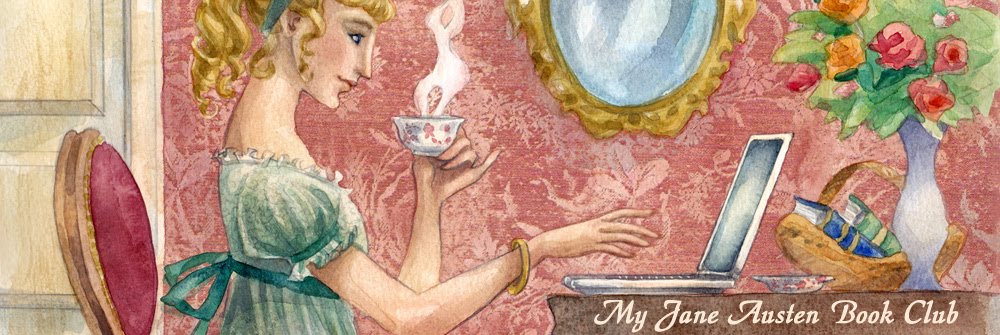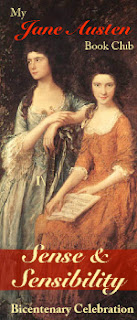Welcome on My Jane Austen Book Club, Heather,
and congratulations on publishing your new novel. I read and reviewed it
(HERE) , so I know what we are talking about. Fitzwilliam Darcy, Rock Star is
actually well-written, though I must confess I was … surprised by my fast pace
while reading. It was intriguing, sexy and romantic at the same time.
Now, first question! How did it come that you started writing a “
sex-drugs-and-rock’n’roll” austenesque novel?
Well, I was reading other Austen fan fiction and was encouraged by my
friends to try writing a story. So I started with a few short stories, and then
worked up to a novel.
When planning FDRS I was thinking about what kind of lifestyle could
Darcy have that would be true to him and still give him the status and prestige
appropriate to the story. So I thought about an artist or a musician. Of
course, he'd have to be a successful, well known artist or musician. None of
this slaving away in obscurity for him! So a very talented, world famous
artisan it was.
And then I was simply inspired by some music. Like most people, I find
that music helps me deal with trying situations, so I figured, why not Darcy?
In Austen's work Darcy has to deal with some very tragic and difficult
situations. As a young man his parents die, and he has the massive
responsibility of an enormous estate with many employees depending on him, and
more challengingly, he has to care for his younger sister. That's what Austen wrote, that's canon.
 |
Rock Guitarist by Yuriy Shevchuk
|
So I figured that Darcy might deal with these complicated feelings
through music, especially if I gave him a musical family. From there, it was a
short leap to Fitzwilliam Darcy Rock Star- he would be extremely talented,
because anything Darcy does he does well. He would be aloof and proud, because
of his talent and his wealth. And he would be very protective of his friends
and family, because he believes he's smarter and better then them.
Into his life would come Elizabeth Bennet, who doesn't like to be told she's
not good enough. And the story starts
there.
Was it difficult to find a publisher?
Not at all. When FDRS was first posted on a JAFF board, the readers made
their own albums of the music, complete with fancy covers, and bought T-shirts
for the (fictional) concert tour. When I presented my solid story with the fact
that it had endeared such a following, I got an offer within a week.
Were you inspired by any real rock band - boy band or girl band - to write your
characters?
 |
| Puddle of Mudd |
 |
| Sheryl Crow |
Slurry sounds like Puddle of Mudd, more than anything else. There are a
few other bands/songs but mostly it's Puddle of Mudd. Jane sounds like Michele
Branch and Elizabeth sounds like Sheryl Crow. One of those "Once it's
pointed out, it's obvious" things is that both of Lizzy's videos shoots
are based directly on Sheryl Crow's SteveMcQueen and Soak Up the Sun.
Can you tell us what your
characters share with Jane Austen heroes and heroines and in what they differ,
instead?
Darcy share's his pride, aloofness and need to protect his friends. He's
different because he's somewhat trapped in his golden cage. Elizabeth is still
funny, charming and still is embarrassed by her family/lifestyle. She's worried
about her career, which in the regency would be being a wife, but now is being
a musician. Jane is still Jane-good and sweet and only sees the best in others.
Charles is mostly Charles, although I gave him a bit of a spine. Charlotte is
still the very, very pragmatic "You should show more affection than you feel" soul that she was in Austen. But
she's modern and has modern social mores, and she's not going to settle for
Collins and his chickens.
Caroline is a very different character, in that she's still in love with
Darcy, but she's not a mean, nasty, suck-up. And hence is more competition for
Darcy. (But not really. Don't worry.) And Richard. Poor, poor, poor Richard.
He's a new man all together. Really,
only his name and his relation to Darcy stayed the same. Well, and that he's
nice and charming.
Of all the characters in Pride and Prejudice, which was the most
difficult to adapt? The easiest one?
There are some that were so difficult I didn't even try, like Mary and
Lydia. And I think Jane's pretty tough. It's hard to make someone that naïve
and sweet work without making her look really stupid. She was hard. (And she
was always speaking with an English accent in my head.) I think the easiest one
was Lady Catherine, who becomes the gorgon who runs the Rosings Park record
company. She makes an excellent tyrant CEO.
How would you define your novel? Fan fiction? Modernization ? Re-telling? What
makes it different from the deluge of Pride and Prejudice- inspired books?
I don't feel the need to label it beyond Jane Austen Inspired Fiction.
As for what makes it different, I think the Rock Star aspect pretty well covers
it.
Try to present it to our
readers in max 50 words
It's a sexy modern version of Pride and Prejudice in which Darcy is a
world famous guitarist and leader of the Rock Band Slurry. Elizabeth is the
guitarist for the up & coming girl group, Long Borne Suffering. LBS is
hired as the warm-up act on Slurry's tour and immediately the sparks begin
flying.
Who do you think is your ideal target reader?
Adult readers who enjoy contemporary romances.
I hope that Austen fans will appreciate the references to Pride &
Prejudice, but its not necessary to be familiar with the story to enjoy my
book.
Sexy romance, steamy scenes, the glamour of the showbiz and truly contemporary
Darcy, Elizabeth, Charlotte, Jane, Charles Bingley and Richard Fitzwilliam. Do
you think true Janeites can enjoy reading your novel? Or do you fear their
criticism most of all?
I think it's unfair to generalize a group as diverse as the Janeites in
to one body. I think some of them will enjoy it and some will find it's not
their cup of tea. I haven't written anything that would cause me to fear
someone's reaction.
When was your first encounter with Jane Austen? Reading which of her novels?
My first encounter was Bridget Jones's Diary, which was a loose
adaptation of Pride and Prejudice. From that, I was inspired to read Pride and
Prejudice, and from there, the rest of Austen's works.
Did you decide to write such a contemporary version of her Pride and Prejudice
because you felt it kind of … out –of –date?
Actually, I feel the exact opposite. It's
because Austen's characters are so strong and vivid that it's easy to picture
them in a modern setting. There was some updating to do on details of the plot,
like Jane being too sick to travel 3 miles to her home, but the main themes of
the plot are certainly timeless.
What is it that still attracts so many readers to Jane Austen’s novels in your
opinion?
Jane Austen is still so popular because her
characters are rich and very complete, and so seem contemporary to us, and
because the major points of her plots are timeless. Also because its excellent,
truly excellent writing. Austen is a genus when it comes to painting her
characters and their emotions in just enough words to make the image perfectly
clear. She also knew how to respect the reader's intelligence. Her pacing is
excellent and the dramatic rise of the story to its climax is textbook.
What is your favourite one? And what about your favourite Austen hero/heroine?
My favorite novel has to be Pride and Prejudice, simply because of the
skill and talent of her writing. And I think my favorite character is Darcy. He
wins me over every time.
 |
| Matthew MacFadyen as Mr Darcy |
Are you working on a new
project? Could you tell us something about that?
I am working on another modern adaptation of Pride and Prejudice called
Longborne and Pemberley go to War. I'm also working on an original paranormal
romance and I'd like to do an updating of Northanger Abbey.
Thanks a lot, Heather. That’s all for now.
Good luck and success to you and your Darcy Rock Star!
Thank you for having me here today Maria, I'm looking forward to meeting
your readers.
GIVEAWAY TIME!!!
Readers from the US or Canada will have the chance to win a free copy of Heather Lynn Rigaud's "Fitzwilliam Darcy Rock Star". Leave your comments/questions for Heather and don't forget to add your e-mail address. This giveaway ends on September 26th. Good luck!


































